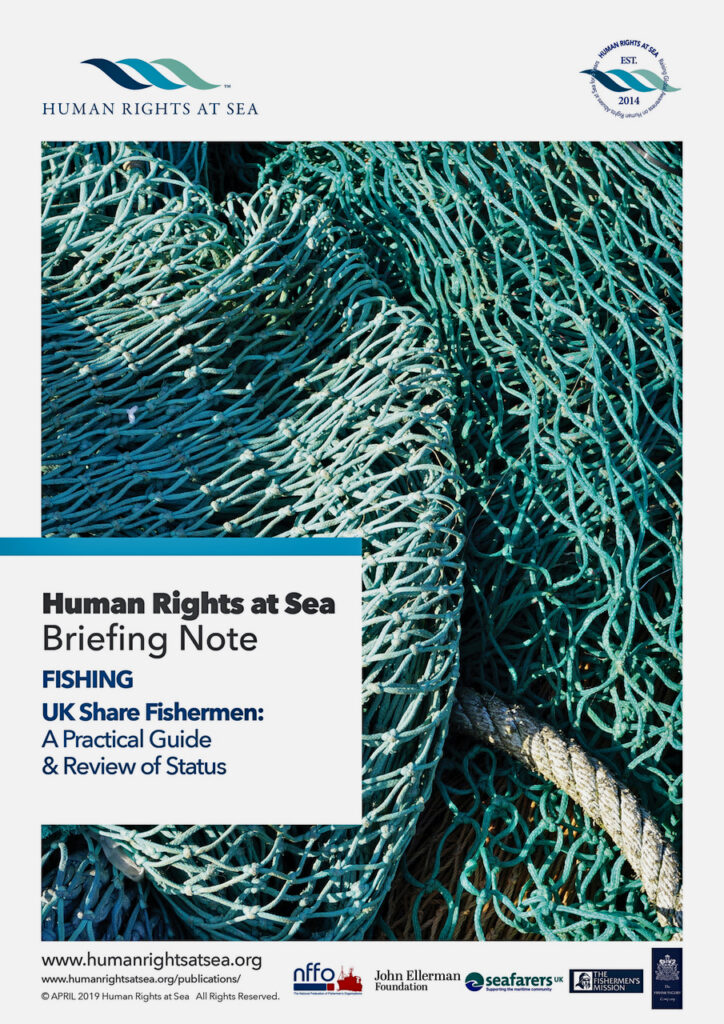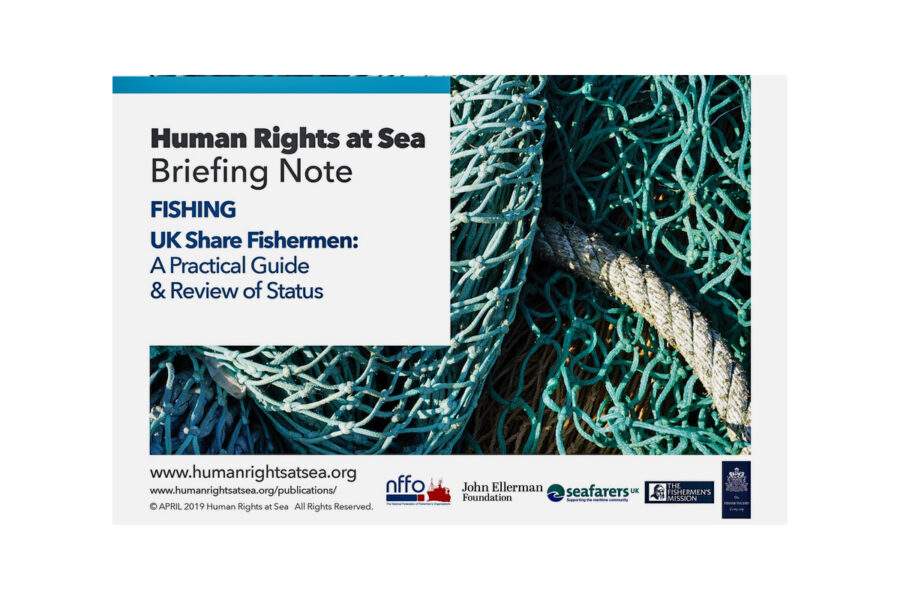No risk to status of share fishermen under ILO 188
Clarification of new health and welfare laws
The legal status of UK share fishermen has been clarified and strengthened after work carried out by Human Rights at Sea (HRAS), along with the NFFO and the Fishermen’s Mission, reports Tim Oliver
HRAS published a new briefing note covering the topic of UK share fishermen in respect of the International Labour Organisation Work in Fishing Convention 2007 (ILO 188). The briefing note provides clarity, and a new reference publication, in support of new UK legislation reflecting the application of ILO 188 in the UK.
It aims to provide a plain-English explanation of the status of share fishermen. It intends to help those in the UK fisheries supply chain to better understand the basis upon which share fishermen are engaged, their activities, and their rights and responsibilities.
ILO 188 is an international minimum standard regulating living and working conditions onboard fishing vessels that came into force internationally on 16 November, 2017, and in the UK on 31 December, 2018. It gives equality to all fishermen, in respect of minimum welfare standards and human rights, on all UK vessels and vessels operating in UK waters.

Front cover of the briefing note published by HRAS: ‘UK Share Fishermen: A Practical Guide and Review of Status’.
It is non-discriminatory, and the default position is that there is no distinction between employed and share fishermen in respect of the rights that ILO 188 confers. But where national legislation provides employed fishermen with rights and protections that go beyond ILO 188 requirements, the position remains unchanged.
ILO 188 requires fishermen to have work agreements, although these are not a contract of service. A work agreement is simply a written document setting out the basic minimum rights and responsibilities of the fisherman – including skippers – and the vessel owner.
The briefing document says that the equality in respect of welfare standards and human rights protections that ILO 188 has brought have been generally been welcomed. But it has caused anxiety among both vessel owners and share fishermen that the moves ‘are a step closer towards eroding the status of share fishermen’. However, the document specifically states: “There is no erosion to the status of share fishermen as a consequence of the work agreement.”
To ‘both allay these fears and to cement the status of share fishermen’ in the future, further work and clarification is needed. The briefing paper sets out three recommendations to try to address the issue:
- ILO 188 work agreements should take account of the particulars of share fishing arrangements, while maintaining certain minimum protections
- Emphasis should be on the rights of fishermen to choose the basis on which they are engaged. “The right of choice to be self-employed and enjoy the potential benefits of share fishing, while also carrying the attendant risks, is central to the profession of a share fisherman,” the briefing paper says
- Some fishermen are paid on a day-rate basis. This falls outside the strict definition of share fishing, as the pay is not relative to the catch value. This raises the question as to the status of such fishermen, and whether their rights under ILO 188 are prejudiced in any way.
Robert Greenwood, NFFO safety and training officer, commented: “The right to be a share fisherman is an important part of the UK fishing industry, and is a historic privilege enjoyed by both fishermen and vessel owners equally.
“The introduction of the ILO 188 Work in Fishing Convention, and its implementation into UK law, includes both employed and share fishermen, and this independent briefing note by Human Rights at Sea clarifies that the rights of a share fisherman should be unaffected by the Work in Fishing Convention changes.”
Commodore David Dickens RN CBE, chief executive of the Fishermen’s Mission, said: “This timely briefing brings much-needed clarity to assessments of the rights of share catch fishermen in light of the Work in Fishing Convention legislation. It also allows individual fishermen and the industry to see clearly the overall welfare balance of choosing to work as a share catch fisherman.”
HRAS founder and trustee David Hammond commented: “We are pleased to deliver this publication, which has been produced with support from the industry, the Fishermen’s Mission and the NFFO, to provide a useful reference tool and explanatory document, in order to assist with understanding UK fisheries working conditions under ILO 188.”
The publication has been co-funded with generous financial support from the Fishmongers’ Company, Seafarers UK and the John Ellerman Foundation.
The full briefing note – ‘UK Share Fishermen: A Practical Guide and Review of Status’ – can be seen at: bit.ly/2XWqcxS
HRAS fights for seafarers’ rights
Human Rights at Sea (HRAS) is an independent maritime charity aiming to challenge and reduce human rights abuses at sea by raising global awareness.
Its mission is to ‘explicitly raise awareness, implementation and accountability of human rights provisions throughout the maritime environment, especially where they are currently absent, ignored or being abused’.
It aims to promote human rights for seafarers, fishermen, and others involved in working at sea, throughout the world in the global maritime supply chain.
David Hammond, a trustee and founder of HRAS, said that the charity had been involved with the UK fishing industry for around three years, to help with clarifying the concept of human rights at sea, as well as the international ILO 188 regulations, and safety and welfare issues involved in implementing them in UK law. This has mostly been done through the NFFO.
“Under our charitable objectives, we use our resources to try to help people to understand the facts and issues about human rights and, through case studies, where and why there are abuses,” he told Fishing News.
“We undertake discreet audits of human rights within the UK fishing industry. We independently highlight where things can be done better, and offer advice – though we are not part of the fishing welfare alliance.”
He said the problem with regard to ILO 188 was one of uncertainty about how it should be applied in the UK, particularly because the great majority of fishermen are share fishermen who are regarded as self-employed.
“It’s always the same when you have international conventions leading to new national legislation,” he said.
“It’s very easy to be critical of legislation when people are not sure of how it will work out in practice.
“We looked at the factual background. What we found was that when we speak to people, often in government departments and other non-fishing organisations, they were not so well-versed in the fishing industry – they didn’t actually understand what the basic issues are.
“We are therefore putting the facts out there, and we hope that the briefing paper helps them to understand the issues raised.”
Pros and cons of share status
Share fishermen are treated as self-employed for tax purposes.
Being a share fisherman has advantages and disadvantages:
Advantages include:
- Payment relative to the value of the catch
- Able to offset certain expenses against earnings
- Choice of when and where they work, and who they work with.
Disadvantages include:
- No guarantee of work
- Pay based only on catch value – risk of no pay from unprofitable trip
- No entitlement to national minimum or living wage
- No sick pay or paid annual leave
- No entitlement to same labour rights as employed fishermen
- Must submit annual tax return, manage own NI contributions, and keep business records
- Must contribute to food costs, unless otherwise agreed
- Require personal insurance against damage from negligence
- Must provide own protective gear and clothing.








